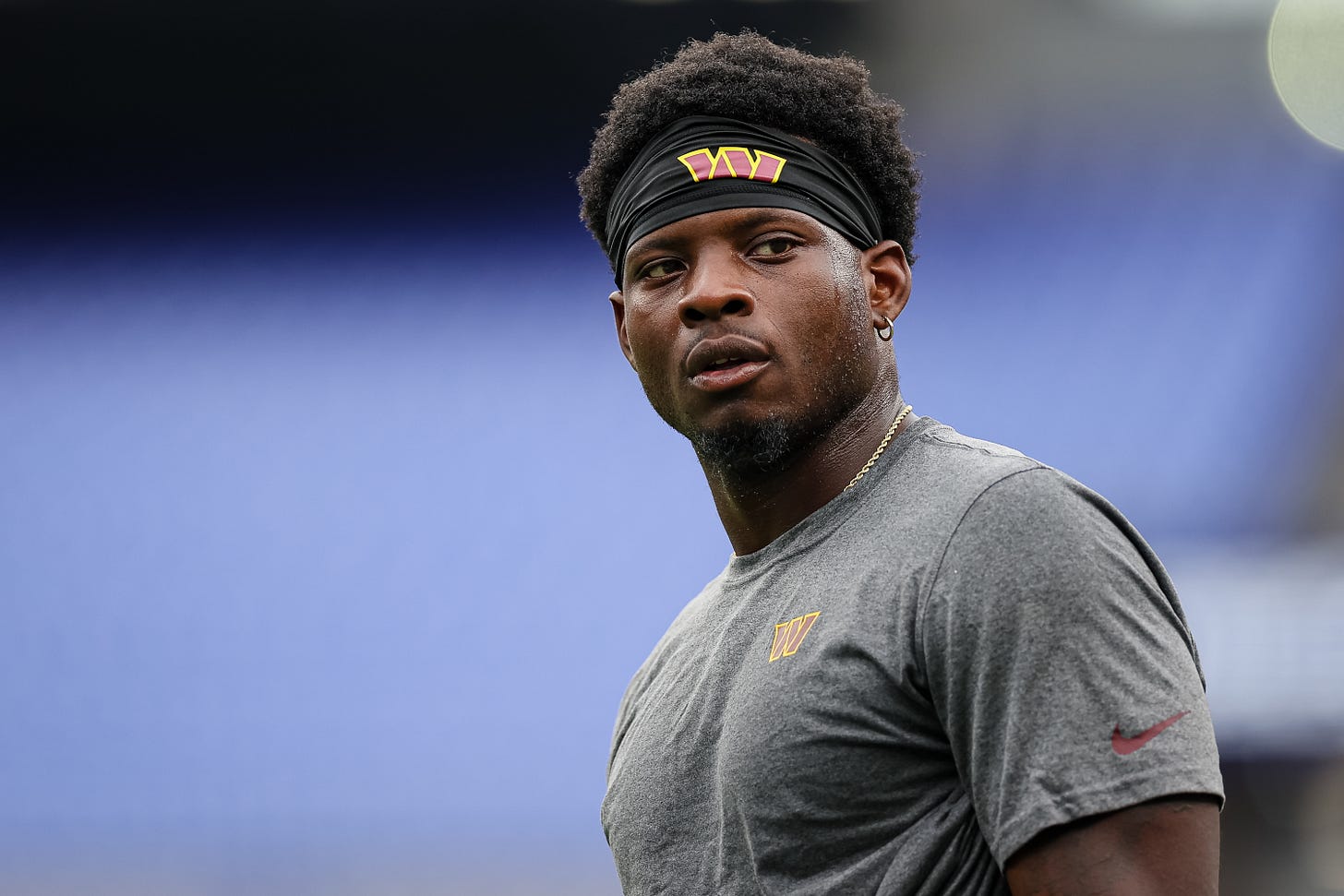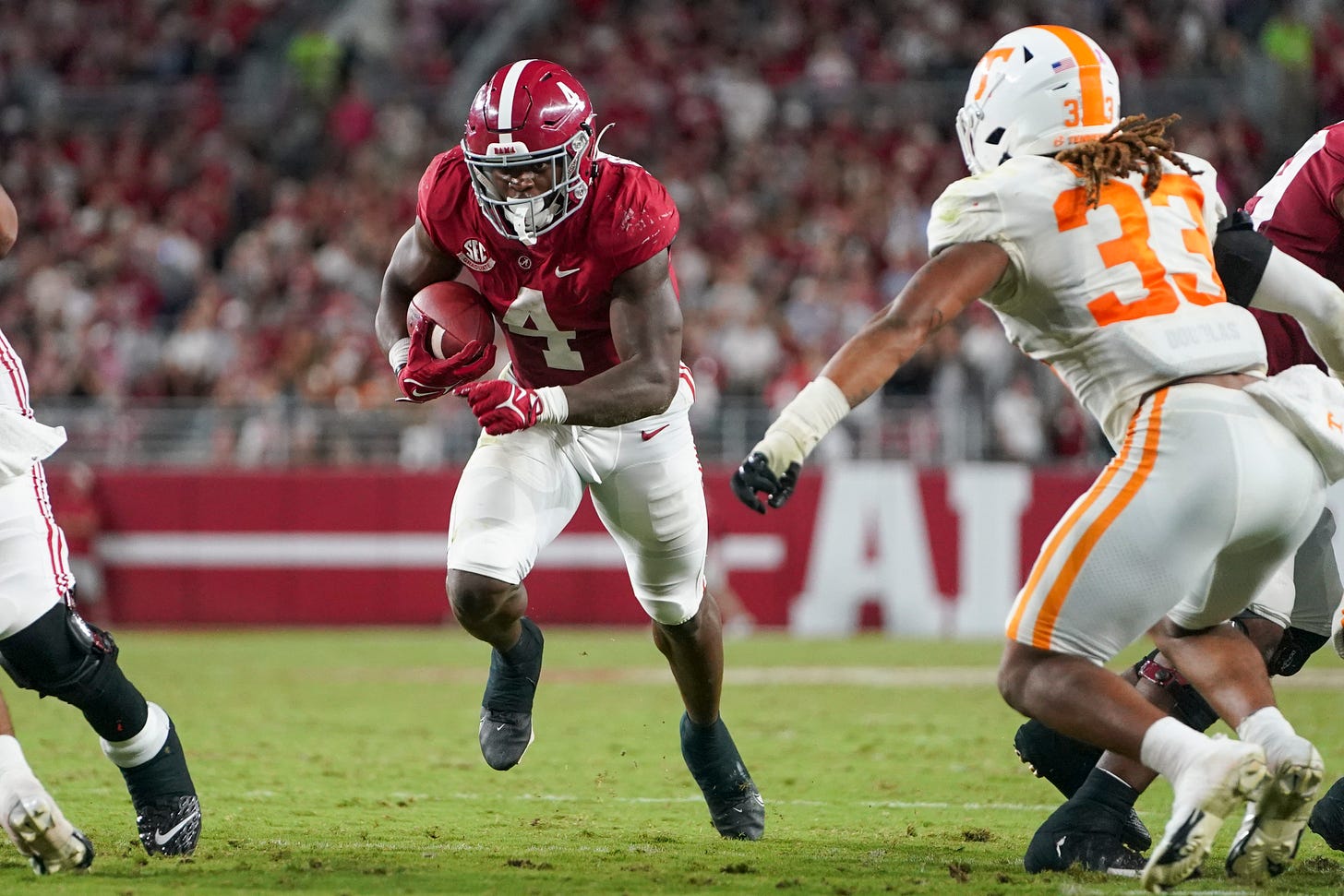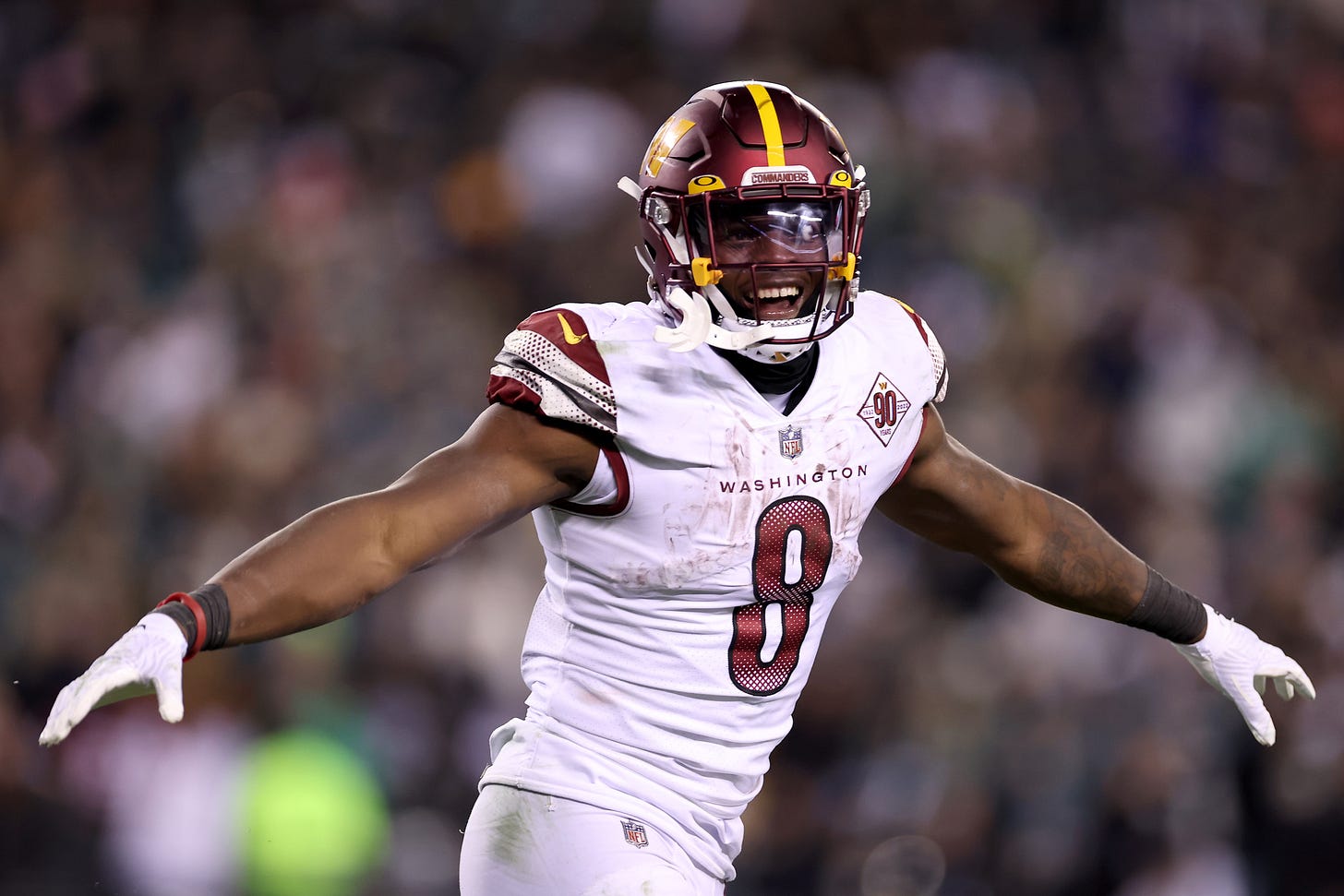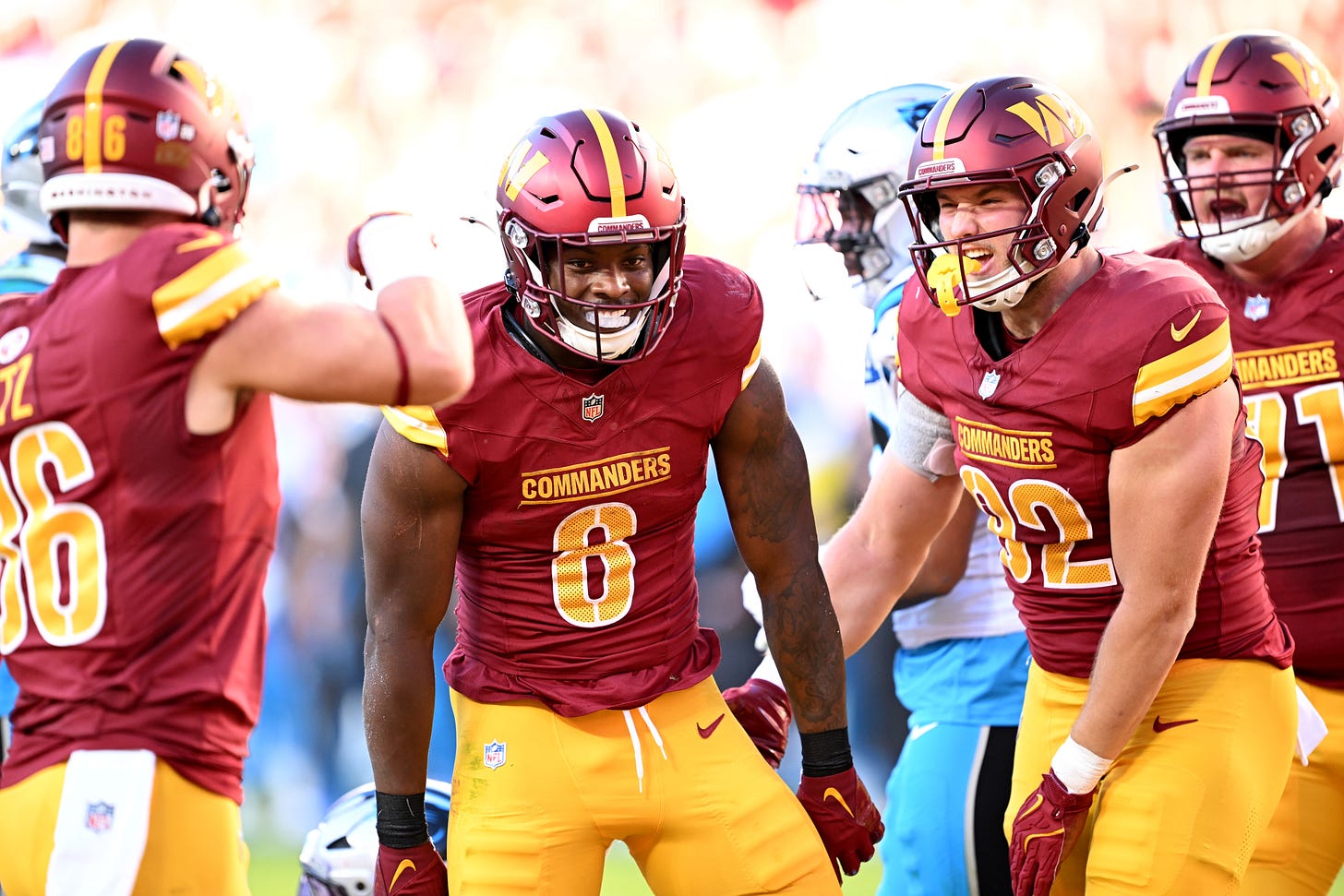‘I can battle anything:’ Brian Robinson Jr. nearly lost his life... then gained a superpower
His life could've ended two years ago. Instead? The Washington Commanders running back gained a superpower. Go Long sits down with the man fueling the uprising in D.C.
ASHBURN, Va. — One bullet pierced his hip. One bullet struck his knee. Both entered and exited the body of Brian Robinson Jr.
He had no clue what the doctor would tell him next.
On a hospital bed, he stayed awake all night. It was impossible to sleep the night of Aug. 28, 2022 because it was impossible to find a millisecond of peace.
The Washington Commanders rookie running back was consumed by fear. Robinson had zero clue what his quality of life would entail. He was lucky to be alive, of course. One of those two bullets could’ve hit a major artery and — 34 days later — one of his assailants pulled the trigger again. This time, the shooter killed his target. That could’ve been B-Rob, perhaps should have been B-Rob given the point-blank range and fact that the shooter wanted his Hellcat.
But in this moment, Robinson felt no relief. Only fear. Only helplessness. Robinson was terrified that one wrong-place, wrong-time incident effectively ended his football career before it began.
His PTSD is real.
It is not easy for Robinson to cycle through the memories.
Seated on a bench in a breezeway that leads into Commanders HQ — the message “I’M IN” plastered atop the nearby doors — he rubs that right knee. Stares down at the pronounced wound for three long seconds. Allows himself to briefly replay that feeling of dread.
“I wasn’t sure,” Robinson says, “what news I was going to get.”
Go Long is your forever home for longform journalism.
Subscribers can access all humanizing player profiles, team deep dives, columns and podcasts.
We are completely fueled by you.
Fast forward to Oct. 20, 2024. He’s now lining up in the backfield, at the eight-yard line, and it’s impossible to disguise his delight. His eyes get big. As if those 11 bodies across the line of scrimmage are a smorgasbord of the most succulent comfort foods he ever enjoyed back in Tuscaloosa, Ala. Robinson cradles the handoff from quarterback Marcus Mariota, burrows through a gaping hole created by his blockers and… hammer time. At the 2 ½-yard line, a pair of Carolina Panthers safeties await: Nick Scott and Xavier Woods. Neither veteran stands a chance.
Robinson torpedoes his 6-foot-1, 228-pound frame so low his back’s parallel with the grass.
Both defensive backs feel his pain.
Robinson extends the ball over the goal line for the 18th touchdown of his career and, inside the end zone, pretends to spoon food into his mouth.
Welcome to this 2024 NFL season’s unannounced party. The football team in D.C. liberated itself from 24 years of Dan Snyder, hired the right head coach (Dan Quinn), found their long-lost quarterback (Jayden Daniels) and now, at 5-2, sits atop the NFC East. A factory of football despair, a team with zero business launching itself into contention is becoming the envy of GMs, coaches, players and it happened practically overnight. Washington is following the lead of the 2021 Bengals and 2023 Texans and one driving force is the man who defied death. Too often, a news story like this serves as volcanic lava across our social feeds for 24 hours, then disappears into ether. Never to be revisited again.
There’s a good chance you heard about this shooting, a good chance you felt goosebumps watching Robinson run out of the tunnel to 50 Cent’s “Many Men” six weeks later that 2022 season.
Then — for all of us — life went on. We plugged Robinson in our fantasy lineups and forget about those bullets. But for Robinson? The memory is never forgotten. Every NFL locker room is teeming with gripping tales of triumph, but this was always different. This was a player caught in the (literal) crosshairs. We love to wax poetic about NFL players being “warriors” and going to “battle.” The 25-year-old sitting down with Go Long here is the ultra-rare example of someone who sincerely did endure the trauma of a soldier overseas.
He’s still coping with the aftershock of it all.
The experience was bound to change him. For better, for worse.
“There’s obviously PTSD,” Robinson says. “It hits you in ways you really don’t see it. To where it becomes natural. I just know, ‘Yo, I’ve been through everything. I can battle anything that’s up against me.’ As long as I keep my mind in the right space — to stay in attack mode — I can take down anything in front of me. I can really take this tree down by myself. Even though it might take a thousand chops at it. I’m going take it down. I know I can take it down.”
He senses himself entering a positive mental space, and stays there.
“Sometimes I run people over and people are like, ‘Oh my God, you just fucking ran somebody over!’ I’m like, ‘I ain’t even feel that shit. I ain’t even feel it!’ Sometimes I hit people so hard and my intent behind it is to fuck people up anyway. I don’t even feel how much of power I put into certain hits.”
He used to feel those collisions. Not anymore. From escaping death once as a child to waiting five years for his opportunity at ‘Bama, he got stronger — and stronger — and then took those bullets.
Brian Robinson Jr. didn’t fully appreciate his second chance at life inside that hospital room.
Two years later, he does. And he’s convinced of one fact:
The shooting has given him a superpower.
Origins
He scowls. He stares ahead. Pumping his arms and thumping his feet, he re-enacts his first dalliance with death.
Robinson was in sixth grade when the storm hit. In truth, he had no clue something so devastating was brewing in the skies. Students in Tuscaloosa got the day off of school because of severe weather concerns. Sure, it was a little strange that his buddy’s mother told him he should go home to be with his family. She never did this.
Yet, all he saw were clouds overhead. Nothing abnormal. He figured this was a bad thunderstorm. Usually, he took his “sweet precious time” walking this mile and a half to his grandmother’s house.
Today? Something deep down inside compelled him to run… fast. He pumped those arms through the deserted street, arrived, hustled inside and immediately huddled with family members in the hallway.
“I wasn’t even in the house a minute and a half,” Robinson says, “before fucking hell started raising outside.”
This was no thunderstorm.
Quickly, Robinson realized he effectively out-ran one of the worst tornadoes in U.S. history. This EF4 multiple-vortex twister ripped everything in its path from Tuscaloosa to Birmingham, 80 miles in all. Sixty-four people were killed. The damage total reached $3.18 billion. When the coast was clear, Robinson walked outside.
“Literally nothing looked the same. Everything was destroyed. … It was disaster. I’m not gonna lie.”
Homes were shredded. Trees, uprooted. Power lines, ripped apart. Cars, picked up in one driveway and dropped in another. Lives changed forever. His grandmother’s home — inexplicably — avoided serious damage, but that didn’t lessen the psychological impact much. Right then, he learned all about “the inches” of life, all about that fragile line between life and death. Jog any slower and this tornado would’ve plucked his own body off the street. Robinson simply stood and stared at his obliterated neighborhood.
The sight of endless rubble shook the 12-year-old to his core.
“Seeing my city in shambles like that?” Robinson says. “I didn’t know what I could possibly do. But I knew whatever it was going to be, I was going headfirst at it. And I was so young at the time, so I had time to really paint out what I wanted to do. Once I realized it was sports and I realized the potential I had at a young age in sports? I didn’t look back.”
Robinson was already a budding talent on the football field. As a six-year-old, he played bloody street ball vs. 10- and 11-year-olds. No pads, no rules, straight “brawling,” he snarls. He held his own and, whenever they played games of Throw ‘em up, bust ‘em up, Robinson managed to get a few licks in. “Young boys out there,” Robinson adds, “learning how to be men. Learning how to get hit and fall down and get up and wipe off a tear, go back and go try to do it again.”
When it was time to strap on the pads and play kids his own age — in an official Pop Warner setting — Robinson resembled more of a centaur. TD… to TD… to TD, nobody believed he was this young. Games were over before they began. His mother needed to get into the habit of bringing her son’s birth certificate because officials would stop the game to check and see if this kid should even be allowed on the field. As Robinson tells this story, he doesn’t laugh because it’s not a fond memory. It pissed him off. Fed his anger. Robinson didn’t understand why adults could not accept their kids getting their asses kicked fair and square.
That being said, it’s hard to completely fault parents for being so skeptical.
Greg Guy, an assistant coach at Hillcrest (Ala.) H.S., was flabbergasted himself the first time he met this hulking 6-foot-1, 180-pound ninth-grader. Most impressive: Robinson was mentally beyond his years. Usually, Guy and the other coaches need to drain the immaturity out of freshmen. This was the complete opposite. “He knew what he wanted to accomplish,” Guy says, “and he really worked that way from the time he walked in the door.” What he wanted was simple. Robinson’s goal was to represent his tornado-ravaged community by starring at the University of Alabama 7.7 miles to the north.
By 10th grade, he was the starter. By 11th grade, he was in nationwide demand thanks to a night witnesses will ever forget.
In a 41-40 loss to Clay-Chalkville, Robinson rushed for a Class 6A-record 447 yards on 29 carries with five total touchdowns. After initially referring to Robinson’s performance as something out of EA Sports, Guy changes his mind. (“You don’t have those nights on video games.”) This was no decrepit opponent from an unincorporated town. Clay-Chalkville reached the state title game that fall and had five players go on to play college ball, including future Houston Texans star Nico Collins. Within 72 hours, Robinson had six SEC offers. To this day, whenever Guy sees coaches on the Clay-Chalkville staff, they bring up Robinson’s surreal night.
Guy started to think the NFL was a real possibility when Robinson dusted a DB from Carver-Montgomery in the open field. Against another school with future D-I players, on a pin-and-pull play, Robinson got to the third level and met an athletic safety 1 on 1. With one “subtle cut,” he wasted him. Wasn’t even touched.
And what absolutely sold Guy that Robinson was special was how he responded to criticism. In the 10th game of his senior year — a meaningless affair with a No. 1 seed locked up — Robinson stepped out of bounds a split-second premature. Coaches called him out during Monday’s film session and saw, up close, a look of total disappointment in Robinson’s face.
He had already committed to ‘Bama by then. His future was secure.
“The fact that it bothered him speaks to who he is,” Guy says. “He still wants coaches to hold him accountable.”
A lifelong lesson stuck, too. That point forward, Robinson made a conscious effort to snatch souls along the sideline.
“He’s lowering his shoulders,” Guy says, “and somebody’s about to get hurt.”
On to college, this desire to vanquish defenders steadily (and painfully) grew Year 1… to 2… to 3… to 4… to Year 5. That’s how long it took for Robinson to take over as the Crimson Tide’s lead back. He was stuck behind Bo Scarbrough, Damien Harris, Najee Harris and Josh Jacobs. “Five whole years,” says Robinson, with a hint of agony. In today’s NIL new world order, the idea of a high school phenom landing at a premier SEC school and waiting 1,460 days as a backup is unconscionable. There certainly were moments of extreme frustration, moments Robinson considered transferring. But he couldn’t. He was too loyal.
Staying in Tuscaloosa was always the goal.
Starring in front of family was always the dream.
That final 2021 season, he rushed for 1,343 yards and 14 touchdowns on 271 attempts.
“He never questioned whether he was good enough to play there,” says Guy. “He knew he was good enough. He always kept working. He’s going to find a way somehow, some way. Even when it’s not looking that way, he’s going to figure out how to get it done. Whatever gets put in front of him, he’s going to find a way through it.”
Rare is the college athlete who is patient, who works. Surrounded by yes-men, offered a treasure chest of cash and a starting gig elsewhere, it’s easy for all 19-, any 20-year-olds to brand themselves the victim and bail. College athletes should be compensated, but this has become more of a wild west that rots work ethic. Saban himself became fed up with the state of college football and retired. Guy is correct to label this an “instant gratification society.”
Robinson won’t sugarcoat those five years — he hated waiting. But he also gained a hunger his contemporaries did not.
The Washington Commanders drafted him in the third round of the 2022 draft, 98th overall, and he was the star of training camp. Running backs coach Randy Jordan repeats Robinson was “phenomenal… phenomenal” all summer long. They planned to feed him. Often.
This time, there would be no waiting five years.
This time, he’d be The Man in Year 1, Game 1, Snap 1.
Then, his life changed forever.
Dodging Death
When the bullet wounds were still fresh, when the pain was indescribable, from the back of an ambulance, he kept his circle tight. Robinson talked to his cousin and — at first? — that cousin thought Brian had gotten into a car wreck. “No, bro,” he told him. “I got shot.” He had the presence of mind to call the Commanders’ security chief… who then phoned Ron Rivera… who then phoned Robinson. The rookie asked if Rivera could deliver the news to his mother. Kimberly Little was working overtime and missed Rivera’s call.
She heard his voicemail, called back and — upon hearing the news — went completely numb. It did not register.
The shooting was random. A sad story replayed too often in all major cities.
On the 1000 block of H Street NE in Washington D.C., a little before 6 p.m., two shooters — ages 16 and 14 — approached Robinson with firearms in an attempted robbery. Prosecutor Jeanine Howard said they tried to take his wallet and keys to a Dodge Challenger Hellcat. Robinson wrestled the older teen to the ground and was able to get the gun out of his hands. But that’s when the younger teen opened fire. Twice. This perpetrator, whose name was not released, admitted to police that he was trying to steal Robinson’s Hellcat.
And, yes. Thirty-four days later, he then killed a 15-year-old named Andre Robertson who was simply sitting on his front porch.
Robinson knows that could’ve been him.
Those fragile first 48 hours, Guy received all of his information through Robinson’s cousin. When he finally got on the phone with his former running back, he sensed a terrifying fear in his voice. Fear that wasn’t rooted in the incident itself, rather the life Robinson believed he had just thrown away. This timing was cruel. To his core, the rookie believed he was set to serve as a workhorse starter. The tornado. The five-year wait. It was all worth it. He couldn’t wait to rep Tuscaloosa at the highest level. The sight of those kids with guns will stay with him for an eternity but, in the immediate aftermath, Robinson worried most about the football life he’d never have.
“I’ve been patient. I’ve been patient,” he lamented to Guy. “I’ve waited. I’ve waited.”
For what?
To get shot? To never play a down?
All over something I have no control over?
Robinson was always an exceptionally upbeat human being. This phone call is one Guy does not wish on anyone. It pained the coach to hear his spirits crushed.
“To hear that doubt in his voice — to hear that doubt in himself — was the first time I’d really ever heard that from him,” Guy says. “That was hard. I want to be the one that picks him up, but I don’t have the answers to the questions he’s asking me. All I want to do is help him and try to get him back to that guy that I know. But at that point, there wasn’t anything I could say to him that I felt like was going to make him feel like everything was going to be OK.”
Guy reminded Robinson he’s always been “goal-driven.” He told him to set one goal at a time, starting with getting out of the hospital.
The day of the shooting, Jordan was actually watching film of Robinson inside his office with Rivera. The two were in the middle of discussing just how dominant Robinson looked when the team’s head of security called Rivera with the news. Rivera’s face went pale. “Brian’s been shot,” the head coach said.
Jordan stared back at him. His jaw dropped. “Are you fucking kidding me?” he asked.
In total disbelief, he needed to get to the kid — ASAP — and help any way he could. Recalling that somber drive to MedStar Washington Hospital Center, Jordan gets choked up. The severity was a total unknown. At that point, the news was spreading like wildfire on Twitter. Some teammates didn’t believe it. Some wondered if Robinson was dead. After sitting in the waiting room, Jordan got to see Robinson on the gurney. There was blood, bandages. “I love you, bro,” he said, with a big hug. On pain meds, the running back was woozy but reiterated, again and again, that he didn’t do anything wrong. “Dude, that’s the last thing I’m worried about,” Jordan responded. “You got shot! I’m thinking about your life!”
Thinking back to this fragile state, Robinson points to each wound.
First, came acceptance.
“That’s going to live with me forever,” Robinson says. “All I’ve got to do is look down and I see the wound. I got one in my knee. I got one in my hip. That’s something that’s going to forever to live with me and I’ll be able to use it for the right reasons.”
The doctor informed Robinson that he could run again. He could play football again. To his amazement, the bullets missed all bone, ligaments, tendons and nerves. If that tornado was a matter of “inches,” as Robinson says, the shooting was a matter of centimeters. A smidge to the left or right and he’s possibly handicapped for the rest of his life. Or dead. Still, even this reality supplied only temporary relief. Robinson had no clue what type of running back he’d be post-shooting. Could he still cut? Explode? Run chumps over? He appreciated the fact that Washington’s training staff took such delicate care of him, but he also realized the NFL is cutthroat. He worried coaches would view him as damaged goods.
Once the games began, if he looked sluggish, his career would be over.
Up close — at the start of the rehab process — Jordan sensed this anxiousness.
“The unknown in terms of being the same guy,” says Jordan, who’s now the Titans running backs coach. “You’re a running back, your No. 1 objective is to be able to do what? Run the football. When you get shot in the leg, that can really put doubt in you. ‘Am I going to be the same guy that I was?’”
From afar, Guy told Robinson he cannot live in fear. “You’ve never been that kind of person,” he said. “We’re not going to start being that kind of person now.”
What came next still leaves both coaches speechless.
Three years prior, Jordan witnessed Adrian Peterson suffer a Grade 1 high-ankle sprain and a Grade 2 low-ankle sprain on Sunday and play four days later. AP even gained 76 yards. It boggled his mind. This is an injury that sidelines players two months. But everything that transpired between Aug. 28 and Oct. 9 that 2022 season? Yeah, this trumps anything he’ll ever see again. One day after surgery, Robinson was back at the facility in crutches with a bag of Oreos. Far as he was concerned, it was still his job to bring snacks to the other running backs. Two weeks after the shooting, he was riding the stationary bike on the practice field and working with the strength and conditioning staff. Two weeks later, he was running routes during warmups with teammates ahead of a Week 3 game vs. Philadelphia.
One conversation sticks with Jordan most. He told Robinson this was no accident, no stroke of luck. To him, divine intervention was at play.
“I wanted him to understand — and I think he does — that on that fateful day,” Jordan says, “he had someone bigger that was by his side.”
Merely six weeks after the shooting, Robinson returned for Washington’s Week 5 game vs. the Tennessee Titans. Arms crossed, in the eerie shadows, he slowly turned 360 degrees. The “Many Men” beat kicked in, he skipped a few times through the smoke of the tunnel and held his arms up. Pointing up to the sky, he jogged toward elated teammates. A timeless scene that made the rounds again on social media when Donald Trump survived an assassination attempt.
Jordan’s voice chokes up again. He was never Coach to Robinson. The rookie always referred to him as My Guy. As 50 Cent’s classic boomed — and Robinson stormed onto the field — he quietly returned the favor under his breath: “That’s my guy.” During the game, Robinson admitted to Jordan that he could only plant his foot in the ground and run forward. Lateral movement was not an option on his knee. The next week, he was able to make one such decisive cut. Later that season, he spearheaded a 19-13 win over the Atlanta Falcons with 105 yards on 18 carries and one 14-yard touchdown reception that announced to everyone he’s back.
After catching a short pass, Robinson lowered his shoulder and blasted directly through poor cornerback Darren Hall.
He finished as the team’s leading rusher that ’22 season. All despite not even being able to straighten out his leg. His health hovered around 75 percent most of the season. “He was in a lot of physical pain that first year,” Guy adds, “that most people never knew about.” Even into ’23, his knee continued to throb at various points.
Finally, he’s feeling like himself again. He’s been smashing through tacklers all fall in this new Commanders offense.
Heading into Sunday’s game against the Chicago Bears, Robinson is averaging 4.7 yards per carry.
Of course, it took one more nudge from new running backs coach: Anthony Lynn.
During training camp, the longtime assistant sensed that Robinson was failing to realize how blessed he was to be alive. Lynn tried conveying the same message as the coach he replaced. “You could be dead, you could be paralyzed,” Lynn stressed. “But, man, you’re playing in the N-F-L. Every day is a blessing.” Robinson admitted that he never thought of it that way before, and thanked him. That point forward, Lynn started to see a player who prepares (and plays) like someone who treats every day as a gift.
He’d know. He’s blessed to be alive himself.
On Aug. 20, 2005, as a Dallas Cowboys assistant, Lynn crossed the street and was struck by a drunk driver. His body helicoptered 50 feet into the air and smashed into a parked Volkswagen. The driver’s blood-alcohol level was three times the legal limit. Lynn suffered three broken ribs, two collapsed lungs and severe facial and shoulder damage that required four surgeries. He recalls the headlights of an oncoming vehicle — nothing else. In and out of consciousness, Lynn thought he was dead. A decade later, Lynn read a sign on the backseat of a NYC cab that said if a pedestrian is hit by a car traveling 60 MPH, the chances of dying are 100 percent. (“I’m looking at it like, ‘Somebody needs to change that from 100 percent to 99.9.’”)
That split-second moment gives Lynn perspective to this day.
Six games in, Robinson is running like a man who knows how easily he could’ve died. Like David Montgomery moving a pile of bodies that exceeds 1,000 pounds, like the beast within linebacker David Long Jr., his punishing style is a distinct reflection of that trauma. Robinson admits he thinks about the shooting nearly every day. Finally, he believes he has figured out a way to harness those emotions for good.
“Knowing that I have that grit and fight and can fight through whatever,” Robinson says. “To be back out there doing what I love to do. Even if I’m right in the middle of running a zone play in the middle of the game — and I think about what I’ve been through — it brings me that extra fire to know I overcame so much just to be in this position. I’m going to take full advantage of having another opportunity.”
Everyone is noticing.
Right guard Sam Cosmi believes Robinson brings an “energy” to the entire offensive line. He runs hard, so they block hard. To him, this is a player who personifies Marshawn Lynch’s legendary quote.
“He wants to run through your face,” Cosmi says. “That’s what we really love about his running style. He’s not afraid to lower his shoulders and take it to somebody.”
After playing with Hall of Famer Terrell Davis in Denver, Lynn has coached backs off all shapes, all styles, all temperaments: Fred Taylor, Marion Barber III, Jamal Lewis, Thomas Jones, LaDainian Tomlinson, LeSean McCoy, Melvin Gordon, Austin Ekeler, Christian McCaffrey to name a few. He loves comparing backs to automobiles and calls his latest RB1 a Long Wheelbase Range Rover Autobiography. Robinson doesn’t have blazing speed, nor elite change of direction. But he is “an elite power runner” who’s constantly falling forward after contact.
Says Lynn: “He moves piles every time he hits a pile. When backs are getting two, three yards, Brian is getting four or five yards. And it makes a huge difference over four quarters.”
Those extra yards keep Washington in third and-short. Crucial for a rookie quarterback learning the complexities of the NFL game. Mostly, those body blows have a cumulative effect on a defense. Physically pulverize defenders into the fourth quarter — over and over and over and over — and Lynch’s words come to life. Business decisions are made. Seven weeks in, Washington ranks third in rushing yards (165.4 per game) and first in rushing touchdowns (14).
When Robinson is alone, Lynn is sure trauma creep in. But he only sees a young man who loves going to work with his “football family.”
Now that he’s gotten to know him as a person, Lynn isn’t surprised one bit that Robinson was able to return to the field so quickly in ’22.
“That’s how tough he is. He wants to be the best,” Lynn says. “He takes nothing for granted and he’s going to try to get every yard he can get. Because I think he’s so thankful for being able to still do this and to be in this football culture and be around these young men and play this competitive game. He realizes how close it was that it could have been snatched away from him. But it wasn’t. He’s been given a second chance and he’s going to make the most out of it.”
At his position, football remains football. For three hours, the most violent athletes in the country are trying to hatchet him down at the knees, body-slam him into the turf, leave him with bruises. Every RB1 is bound to hurt like hell on Monday AM. And Tuesday AM. All season long. But the reality of his profession — the fact that he’s got a virtual target over the No. 8 on his chest — never phases Brian Robinson Jr.
He’s overcome with a new emotion these days: Fearlessness.
“You can overcome. You can fight against it. You can put your best fight up against anything that’s up against you,” says Robinson. “The worst possible thing ever that could happen to you, it’s not going to happen out there between them lines.”
Seated here is the emblem of a new day for the franchise.
Gone is Dan Snyder, somewhere in Europe. The only two NFC teams who haven’t reached the NFC Championship Game since 1995 are Dallas and Washington. Bad owners create bad teams. There’s a newfound sense of tranquility in this pocket of Virginia this autumn.
The Commanders are prepared to win — now.
Eyes Forward
The blank slate can be daunting. New owners. New GM. New head coach. The chance at a new quarterback with the No. 2 overall pick. More cap space than any team in the NFL: $87 million. Very rarely does any NFL franchise have the opportunity to start from scratch to this extreme.
There’s everything we see. Washington obviously hit the jackpot with LSU’s Jayden Daniels, a quarterback who drew “Mahomes” comparisons from scouts. Adam Peters, the former 49er exec, spread that money around in free agency, too. Bobby Wagner, Zach Ertz, Dorance Armstrong, Frankie Luvu, Dante Fowler Jr., Nick Allegretti and Ekeler were all signed to reasonable contracts. This roster’s a healthy blend of young and old.
But the reason these Commanders are poised to contend for a championship three to five years ahead of schedule is what we don’t see.
Dan Quinn, the team’s 54-year-old head coach, knew how to recreate the Commanders from within. Lynn has played or coached for a third of the NFL and he calls Quinn “one of the best culture-builders” he’s ever met. Under Quinn, all assistants have a very unique method to measuring each individual player. Specific strengths and weaknesses are drilled down in a way he’s never witnessed before.
Belief is growing — game to game — and it’s rooted in Quinn also letting the players write the team’s official creed themselves.
Before they played one snap, players decided what they want the Washington Commanders to be.
“They wrote it and it’s just our job to help them carry it out,” Lynn says. “Dan does a heck of a job of just reiterating and then demonstrating. You can do it with video. You can do quotes. Pictures around the building. He’s just constantly showing examples of what it’s supposed to look like and constantly over-communicating in the meetings what it’s supposed to look like. The guys have bought in and it’s theirs.”
Cosmi played his first three NFL seasons under Rivera and while he calls himself a “glass half-full” type of player, losing took a toll.
He’s the first to admit he did not see this 5-2 start coming. At all.
“It’s my first time being able to feel a positive, upbeat culture,” Cosmi says. “Guys that want to work hard, that’s really hard to do and it’s very impressive to be able to instill with such fast timing. We have a ton of guys that are bought in. It’s really hard to do that. You can talk the talk, but you’ve got to walk the walk.”
All meetings, all practices, all speeches are an extension of that creed the players authored. Nothing is forced via awkward Saturday Power Point. The 53 inside the locker room are in charge and then — when everything shifts over to gameday — the greatest example that Quinn could ever use is the player given the ball more than anyone else.
He’s himself again. He’s winning games. It’s all the best feeling in the world.
Robinson is taking every piece of advice from Guy, Jordan and Lynn to heart.
“I’m all about ball right now,” Robinson says. “This is a once-in-a-lifetime opportunity and I’m serious about it, so I care about my body and my mind and my soul and everything just to make sure that I’m always in the right space to perform at the highest level on a day-to-day basis. Not just on Sunday, but on Monday, Tuesday and Wednesday.
“I’m very serious about what I do leading up to the battle.”
From Tuscaloosa, Guy doesn’t only see the explosive back who torched Clay-Chalkville for 447 yards. He also knows Robinson is in the right mental space. Robinson flat-out told him recently: “I can’t live my life in fear. I can’t live my life worrying, Is this going to happen? Is that going to happen?” Jordan is still keeping an eye on Robinson, too. “I’m so proud of him,” the coach says, “because of where he’s come from, where he’s been, and not letting yesterday dictate today. He’s living in the moment.” Here, Robinson doesn’t want to get too reflective because that could plant a seed of complacency and — several times over — he insists he’s trying to do everything in his power to fight that complacency.
“I can run for 270 yards and five touchdowns,” Robinson says, “and I’m going to look at the film and say, ‘I could have done this better. I could have been better here.’ I’m never, never satisfied.”
He checks the time and realizes an offensive meeting begins in a couple minutes, but he’s not rushed. A fly lands on one of his dreads, and Robinson doesn’t even notice. Or care. Eventually, it zips away. Robinson looks at those bullets one final time. These scars will stay with him. The key to moving past that night is to only concern himself with the present.
Asked which collision this season has been his favorite, he smiles. He refuses to look back even one week.
Instead, Brian Robinson Jr. lets three words dance in the wind before hustling back into the building.
“The next one.”
Thank you for supporting Go Long, your home for longform journalism this 2024 season:
Recent Friday Features:






















i'm just to sad for him